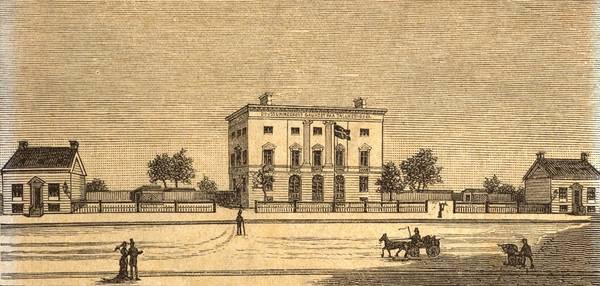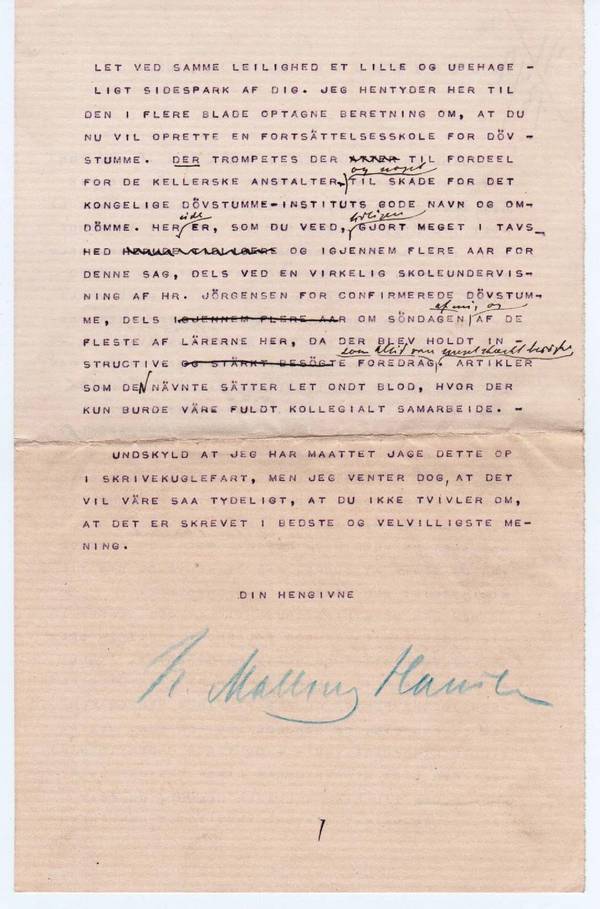1879.05.12 English
C O P E N H A G E N MAY 12 1879
DEAR FRIEND, DEAR PROFESSOR KELLER[1]. THANK YOU VERY MUCH FOR YOUR KIND LETTER. THE DAY BEFORE I RECEIVED IT I SAW THE SHORT ARTICLE OF REPLY LASSEN[2] HAD PRODUCED FOR YOUR BENEFIT, AND I ADVISED HIM NOT TO SEND IT OFF, AS I FOUND IT RATHER UNCLEAR AND MUDDLED – EVEN TO PROFESSIONALS IN THE TRADE. NEVERTHELESS, IT WAS SENT OFF FOR PUBLICATION, AND BEING THIS THE CASE, IT WOULD HAVE BEEN BETTER IF THE MATTER HAD BEEN SETTLED AND FINISHED IN BERLINGSKE[3] . – I DO BEG YOUR PARDON, BUT YOUR SHORT RESPONSE IN SATURDAY’S BERLINGER REALLY WAS TOO HURTFUL AND BRUSQUE, SO LASSEN HAS AGAIN SENT A REJOINDER TO THE PAPER. I DON’T KNOW THE CONTENT. HIS FIRST ARTICLE TOOK ME TOTALLY BY SURPRISE, AND I WOULD ABSOLUTELY HAVE BLOCKED IT, HAD I ONLY KNOWN ABOUT IT. IN PARTICULAR BECAUSE IT WAS VERY BADLY TIMED, AND ALSO SINCE I AM OF THE OPINION THAT IN CASE MR LASSEN INTENDS TO PROPAGATE IN THIS OR OTHER DIRECTION HE WOULD DO BETTER TO TURN TO THE MINISTRY WITH HIS APPLICATION AND PROPOSALS.
HOWEVER, THE MAIN REASON WHY I SEND YOU THESE LINES IS THE FOLLOWING. IT IS FULLY UNDERSTANDABLE AND NATURAL THAT YOU PUT YOUR ENTIRE BACK AND S_T_R_E_N_G_T_H INTO CARRYING YOUR PLANS INTO EFFECT AND ALSO TO WIN SUPPORTERS FOR THEM; BUT - - PLEASE ALLOW ME, DEAR FRIEND - - AT TIMES YOU, IN THE COURSE OF THE ENDEVOURS TO ACHIEVE YOUR GOALS, PAY SOMEWHAT INSUFICIENT HEED TO YOUR COLLEAGUES AT THIS INSTITUTION; THEY – OR RATHER THE INSTITUTE – QUITE OFTEN EXPERIENCE SOME UNPLEASANT BACKBITING FROM YOUR SIDE. I AM REFERRING TO THE STORY RUNNING IN SEVERAL NEWSPAPERS, ACCORDING TO WHICH YOU ARE PLANNING TO ESTABLISH A SCHOOL FOR CONTINUING EDUCATION FOR THE DEAF-MUTE. THESE ARTICLES BROADCAST SUPPORT IN FAVOUR OF THE KELLER INSTITUTIONS AND TO SOME EXTENT CAUSE DAMAGE TO THE GOOD NAME AND REPUTATION OF THE ROYAL INSTITUTE FOR THE DEAF-MUTE. AT THIS PLACE, AS YOU WELL KNOW, MUCH HAS BEEN DONE QUIETLY AND THROUGHOUT SEVERAL YEARS, PARTLY BY A QUALIFIED EDUCATION THROUGH MR JÖRGENSEN FOR THE BENEFIT OF THOSE WHO HAVE BEEN CONFIRMED DEAF-MUTE, PARTLY AT SUNDAYS BY ME AS WELL AS BY MOST OF THE TEACHERS HERE, GIVING INSTRUCTIVE AND EDUCATIONAL LECTURES, ALWAYS VERY WELL ATTENDED. ARTICLES SUCH AS THE ONE REFERRED TO ARE APT TO CAUSE ILL-FEELINGS, WHERE ONLY GOOD COLLEGIATE SPIRIT AND COOPERATION SHOULD REIGN. –
I APOLOGIZE HAVING HAD TO HASTEN THIS MESSAGE, USING THE WRITING BALL, BUT I DO EXPECT THAT IT WILL BE SUFFICIENTLY CLEAR FOR YOU TO NEVER DOUBT FOR A MOMENT THAT IT HAS BEEN WRITTEN WITHTHE BEST AND MOST KINDLY INTENTIONS IN MIND.
YOUR DEVOTED
R. Malling Hansen[4]
[1] SA: Johan Keller (1830-1884) was founder of the ‘Keller Institutes’, dedicated to the education of what was at the time called the ‘imbeciles’ and the deaf-mute. At times Keller and RMH cooperated well, but conflicts between them also occurred. They were in a state of ‘competition’ in relation to the pupils, because the Keller institutes had an ambition to accept as many pupils as possible, this being linked to increased governmental financial support. In 1867 they reached an agreement according to which the totally deaf pupils were to be educated at the RMH Institute, while the partially deaf as well as the ‘imbeciles’ were to be referred to the Keller Institutes. Nevertheless, RMH felt that Keller did not respect the agreed partition, and throughout the 1870s and 1880s there was constant friction between them. RMH was at all times a zealous supporter of the government assuming responsibility for the private institutions and, in that process, submit all educational institutions for the deaf to a common comprehensive plan. As the letter shows, Keller was adept at marketing and garner support for his plans, and in 1880 he was granted a major governmental loan for the financing of a completely new school for the deaf-mute, “School for the deaf, based on the so-called ‘oral method’, situated in Baldersgade. Around the same time the authorities approved RMH’s proposal to establish a new government institute for the deaf-mute, leading to the foundation of the Fredericia institute in 1880. With hindsight, it does seem as if the authorities did not want to make up their mind whether they wanted to support governmental sponsorship of the institutes, or whether private interests should be allowed to continue establishing their own schools. Not even when Keller died suddenly in 1884, and his widow, his son and his brother applied for permission to continue running his institutes did the authorities make up their mind. A decision was taken only in 1888 with the appointment of a committee mandated to present a bill concerning the organization of education for the deaf-mute in Denmark. RMH headed the committee together with his old friend Georg Jørgensen (1838-1905) , principal of the Fredericia Institute. It was to no-one’s surprise when the committee proposed that the Government take over the Keller Institutes; this was decided in ‘Folketinget’ (Parliament), and simultaneously it was decided to establish yet another institute at Nyborg. At the same time Folketinget passed an overall plan for all schools for the deaf, according to which all pupils were to be enrolled initially at a pre-school in Fredericia, subsequently being channeled after one year to the various schools and institutions in order to receive an education as much as possible adapted to their individual auditive and cognitive capabilities. This thinking was very foresighted and visionary for its time, and Denmark was a leading country in this field in Europe.
[2] SA: Hans Jensen Lassen (1849-1911; later assuming the name of Ketting) was at the time one of the teachers of the Royal Institute for the deaf-mute. He was later appointed principal. Seen from our present day perspective it would seem a somewhat odd procedure for a school teacher to publish new proposals regarding his school in the press, without this being cleared beforehand with his superiors. Further information about Principal Lassen can be found on his descendant's website: http://www.ketting.dk/hvem.html .
[3] SA: Berlingske Tidende, one of the most important Danish daily newspapers at the time and still today. It does seem a peculiar procedure to carry on extended and heated discussions in full public limelight in the media about issues that seem to belong to internal meetings and conferences.
[4] SA: RMH demonstrates in this letter that at times he could certainly be a placating and conciliatory mediator. Otherwise he was known for his irritable nature and at times could become rather hotheaded when things turned against him. In such situations he could become rather unreasonable, blowing up other people’s injustices into enormous proportions and simultaneously reducing his own into a molehill, as stated in the centenary book about the Institute for the Deaf-Mute, published by Goos in 1907.

- The teachers at the Institute on a photo taken not long after the passing away of Malling-Hansen in 1890. Lassen is seated as number two from right in front. Behind from right: Malling-Hansen's son-in-law Fritz August Bech, N. Thomsen, employed 1889, H. M. Hansen Rosbjerg, employed 1889 and Lars Vilhelm Lindholm. To the left of Lassen is P. Petersen and O. C. Jensen, and to the right, the deaf teacher Nyegaard. Photo: Døvehistorisk Selskab

- Not long after this letter was written, Keller was granted a public loan to build a new institution in Baldersgade. Photo: Døvehistorisk Selskab




